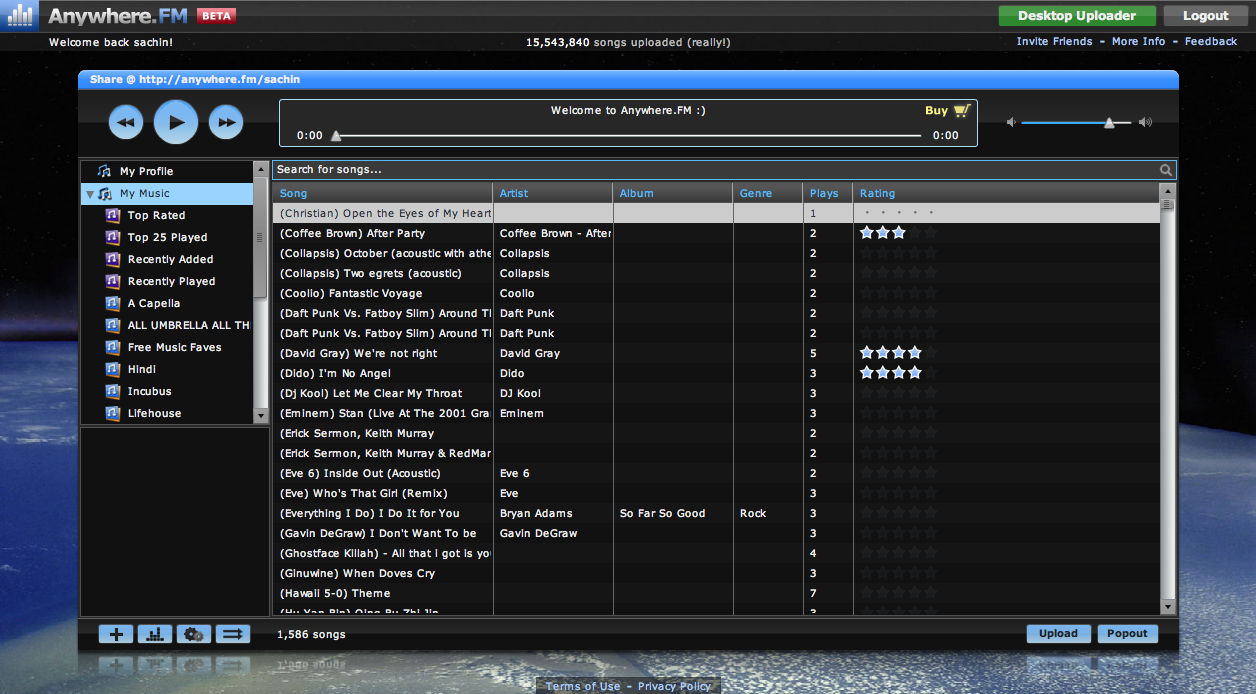New Course: Finding Product/Market Fit

The hardest part of bringing a new product to market is always the elusive hunt for product/market fit. Marc Andreessen describes product/market fit as "being in a good market with a product that can satisfy that market". I've dedicated my entire career to five such hunts across the three startups I co-founded as well as the new products I built at LinkedIn and Microsoft. Despite sounding so simple, I have plenty of scars from failing to find product/market fit, but also from the long and winding path it ultimately took to get there.
In 2007 I founded my first startup, Anywhere.FM, which developed a web music player that allowed you to upload your entire music collection to the web and then stream it from anywhere. Influenced by being an early Y Combinator company, we leveraged the emerging Lean Startup methodology popularized by Eric Ries. The methodology was a direct reaction to the failures of dot com era startups, including their focus on putting together elaborate business plans and enduring long product development cycles before launching to customers. Instead the Lean Startup encouraged launching a minimum viable product (MVP) as quickly as possible to maximize customer feedback from real users. So we did just that: hurried an MVP to market in a matter of months and got tons of early feedback from customers. But despite doing this, garnering glowing press reviews, and growing to over 100,000 users, we still ultimately failed to find PMF because we were never able to find a viable business model for our product. While we were ultimately acqui-hired by imeem for the impressive tech we had developed, our dreams of building an independent web music player were over.

When we were working on Anywhere.FM, we came across another small music startup founded by Daniel Ek in Sweden. We didn't think much of the startup at the time because they had spent two years just building their product before ever launching it. Given their slow pace of innovation, which contradicted the principles of Lean, we assumed they wouldn't amount to much. But as we know, Daniel Ek's little startup Spotify went on to revolutionize the entire music industry and popularize the music streaming paradigm we all take for granted today.

The experience of failing on Anywhere.FM while watching Spotify's meteoric rise led me to become obsessed with what separates those that find product/market fit from the rest? This obsession not only grew my desire to build a successful startup, but also to find a better process for doing so. I wondered whether there was something beyond the Lean Startup that would increase the odds of finding product/market fit on my next venture. I began experimenting with all sorts of alternative techniques in my next venture, Connected, which was ultimately acquired by LinkedIn. At LinkedIn I got the opportunity to incubate a new premium subscription for sales professionals, called LinkedIn Sales Navigator, where I continued to iterate on practices for finding product/market fit, this time for expanding the product portfolio of an established tech giant. When looking back at Sales Navigator, its the most successful new product I've gotten to build, now generating over $1 billion in annual sales for Linkedin. But more importantly, the process we leveraged to get there looked entirely different than Lean.

In this new course, we introduce the Deliberate Startup methodology, a modern approach to finding product/market fit that solves the top challenges with the Lean Startup. In particular, we address the following shortcomings of Lean:
- While Lean focuses you on agnostic experimentation, the Deliberate Startup encourages you to start with a thoughtful plan. We'll help you to document your initial product strategy in a short PMF narrative document that lays out each of your key assumptions across 6 critical dimensions.
- While Lean focuses you on launching successive MVPs, the Deliberate Startup encourages you to leverage a much wider set of validation techniques to more effectively validate your product idea. We'll help you identify your product's riskiest assumptions and then tailor your validation to specifically de-risk them.
- While Lean glosses over specific metrics for measuring PMF, the Deliberate Startup provides actionable and clear metrics for measuring PMF and then specific guidance on what to do next given where you are in your PMF journey.
- While Lean over-emphasizes product development over sales & marketing, the Deliberate Startup encourages you to focus on traction development alongside product development. We'll share specific strategies for determining your initial short-term traction channels as well as approaches for establishing your first growth loop for sustainable growth.
Despite the fact that seasoned product builders have all moved beyond the Lean Startup, it still remains the most popular approach leveraged by first time entrepreneurs today. With this course, we hope to offer an actionable alternative that increases your odds of finding product/market fit on your next venture.
This program is a 4 week, part-time, virtual course available globally on Reforge. It's targeted at product builders, which includes not only product managers, but also the engineers, designers, and marketers on the founding team. It's also equally applicable across early-stage startups as well as established organizations looking to expand their product portfolio.
Join us for the upcoming cohort of Finding Product/Market Fit starting the week of March 20.
Apply to Reforge Today
Want to accelerate your product career?
I've finally distilled my 15+ years of product experience into a course designed to help PMs master their craft. Join me for the next cohort of Mastering Product Management.
Are you building a new product?
Learn how to leverage the Deliberate Startup methodology, a modern approach to finding product/market fit. Join me for the next cohort of Finding Product/Market Fit.
Enjoyed this essay?
Get my monthly essays on product management & entrepreneurship delivered to your inbox.
Aug 23, 2022

